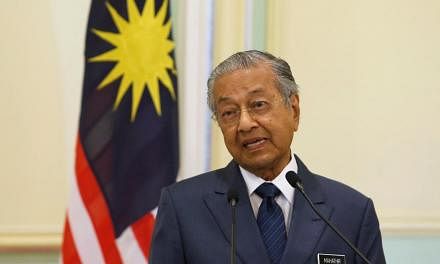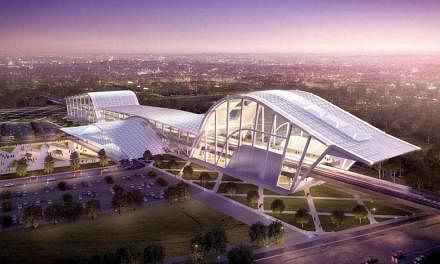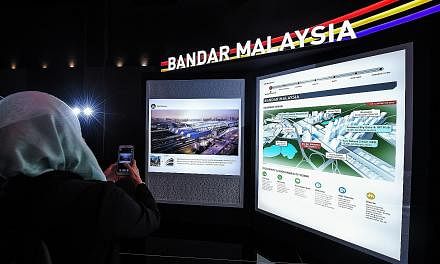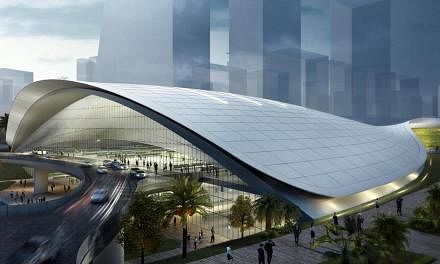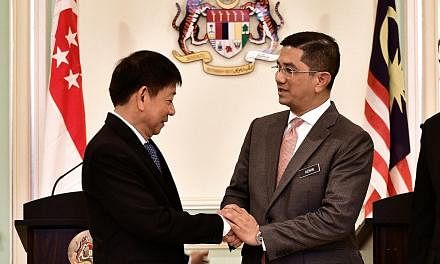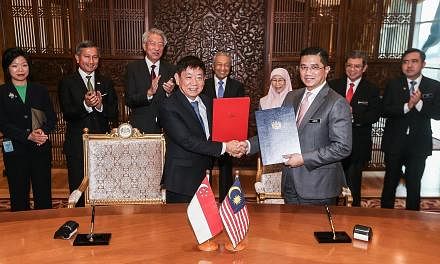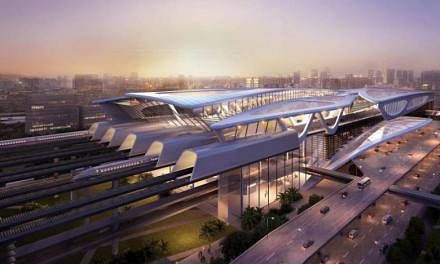SINGAPORE - The underlying rationale for the GST hike is not affected by the outcome of the HSR project as the planned increase was never meant to finance lumpy investments in infrastructure, said Second Minister for Finance Lawrence Wong on Monday (July 9).
He was responding in Parliament to Mr Pritam Singh, who wanted to know if the possibility of the KL-Singapore High Speed Rail project being scrapped would have any implications on the Singapore Government's plans to raise the goods and services tax from 7 per cent to 9 per cent some time between 2021 and 2025.
Mr Wong said: "Mr Singh has tried to link the prospect of the HSR project being cancelled to the government announcement to raise GST. But these are two separate matters.
"The increase in GST was never meant to finance lumpy investments in infrastructure in the first place. We have already made this clear in the Budget statement."
Mr Wong noted that the main drivers for rising government expenditure in recent years, and in the years to come, are healthcare, security and social spending - "broad-based, structural increases in recurrent spending". Healthcare spending, in particular, is expected to rise sharply over the coming years due to the rapidly ageing population.
Singapore must raise recurrent revenues - of which the planned GST hike is one component - to pay for these ongoing needs year after year.
"This is the responsible way to ensure that every generation pays for its own spending in a sustainable manner," said Mr Wong.
Singapore takes a different approach to financing lumpy investments in infrastructure.
First, where possible, it will save ahead and set aside funding for such investments through initiatives like the Changi Airport Development Fund and the Rail Infrastructucre Fund.
Second, it will finance infrastructure through borrowing by statutory boards and government-owned companies. This, said Mr Wong, will apply to larger investments that can generate economic benefits over many years, like the Changi Terminal 5, the HSR and the JB-Singapore Rapid Transit System Link.
"Therefore, the underlying rationale for the GST rate increase is not affected by the outcome of the HSR project. Our population will continue to age. More Singaporeans will need support to care for their loved ones," he said. "Ultimately, the Government will require more recurrent sources of revenue to support these needs."
Mr Pritam rose to ask whether the Finance Ministry would, in the event of the HSR being cancelled, consider lowering the Net Investment Returns Contribution (NIRC).
Mr Wong replied: "Again, I think Mr Singh is trying to link things that are clearly of no relationship at all."
The NIRC, he said, is a separate matter, and the largest source of revenue for the funding of Singapore's overall budget.
"With regard to infrastructure projects like the HSR, we are financing them separately through borrowing," said Mr Wong. "It's the right thing to do because these infrastructure projects are long-term in nature, and borrowing will help us to smoothen the expenditure of these projects over the longer period to better match the benefits of the projects, which will also be for a long period of time."
Even if the HSR were to be terminated, the trend of rising overall expenditure will continue, in particular when it comes to recurrent expenditure, he said.
Mr Wong stressed that Singapore has yet to receive an official response from the Malaysian government on its position on the HSR.
Unless the project is terminated, Singapore has to meet its obligations under the legally binding HSR bilateral agreement, and will continue to incur costs in this regard. In the event that Malaysia causes the project to be terminated, Singapore will exercise its rights under the bilateral agreement and international law, including with respect to compensation for costs, said Mr Wong.
To the queries of Mr Singh and Non-Constituency MP Daniel Goh about the expenditure of the HSR project, he said the Government's practice is not to reveal the costs of projects until tender processes are over as doing so could affect the behaviour and pricing strategy of bidders.
Mr Wong added: "The Government's fiscal approach is sound and sustainable for the long term. We will continue to manage our public finances prudently, while ensuring we look after the needs of our citizens and our economy in a responsible manner."
He later rose once more to rebut another point on funding made by the Workers' Party, in response to a question from Mr Liang Eng Hwa (Holland-Bukit Timah), who wanted clarification on the $5.3 billion of capital reserves in national water agency PUB's accounts.
Mr Wong noted that the Workers' Party had in June posted a video clip on its Facebook page questioning why the water price increases were necessary when the national water agency's capital reserves had gone up from $3 billion to $5.3 billion over the last decade.
Mr Singh had spoken about the reserves in his speech during the debate on the President's Address in May, in which he said that the Government needs to re-examine if there are other ways to raise revenue to cushion price hikes on Singaporeans.
Mr Wong said on Monday: "The Workers' Party and Mr Singh have interpreted the PUB's capital reserves as a hoard of cash surplus that the Government is keeping in PUB's accounts. But this is completely inaccurate, and demonstrates a basic misunderstanding of accounting fundamentals."
The capital reserve does not represent surplus funds. Most of the funds, he said, are already invested in the agency's property, plant and equipment, which includes the upgrading of waterworks, water reclamation plant expansions and investments in water treatment process.
"These are important investments to ensure a secure and sustainable water supply for Singapore," said Mr Wong, adding that the increase in PUB's capital reserve must be seen in conjunction with its growing asset base.
The capital reserve alone has, in fact, not been sufficient to fully cover the agency's investments in water infrastructure. That is why it has had to borrow from the capital markets for its investments and will continue to do so, said Mr Wong.
"In short, there is no surplus cash in PUB. It is either ignorant or completely disingenuous to link the water price increase with the PUB's capital reserve, as there is absolutely no basis to do so," he said. "I hope this clarification will set the record straight. I also hope the Workers' Party will refrain from distorting the facts to mislead the public."
He added that he hoped the Workers' Party would post his response on their Facebook page to correct the record - something which Mr Singh later said that his party would look at.
Mr Liang, Mr Singh and Mr Low Thia Kiang (Aljunied) also asked for more details about the nitty-gritty of PUB's finances and annual reports, and how water investments will be funded in the years to come.
The flurry of questions prompted Speaker of Parliament Tan Chuan-Jin - who has been part of a Web series about how to be an MP - to note wryly to a round of chuckles: "We need a new video series on how to be an accountant."


